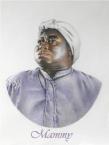 Since the time of black American slavery (some even dare say before, on the continent of Africa), black women have been considered the center of the black family. Matriarchy, the argument goes, has been necessary because black women have been in the position to support the family without being a threat, as the black man is, to the white power structure. Black women’s leadership, regardless of the reason, has led to us being what writer Zora Neale Hurston called the “mules of society.”
Since the time of black American slavery (some even dare say before, on the continent of Africa), black women have been considered the center of the black family. Matriarchy, the argument goes, has been necessary because black women have been in the position to support the family without being a threat, as the black man is, to the white power structure. Black women’s leadership, regardless of the reason, has led to us being what writer Zora Neale Hurston called the “mules of society.”
Our hard work has also generated many stereotypes, including the domestic and domineering Aunt Jemima and mammy, and the sassy Sapphire. As a result of these stereotypes, many see black women as overbearing. Some of us don’t consider ourselves domineering; we choose to call ourselves strong black women (SBW). Like some blacks who have reclaimed the word nigger as a term of endearment, black women have embraced the label strong black woman without fully recognizing its detrimental effects. This is the reason I have written this book: To tell us that it is no longer time for us to believe our strength is in sitting on the term strong black women.
I believe that the SBW that emerged from negative stereotypes is a myth that black women have welcomed to their detriment. I am not the only one who argues this; Scholar/writer/activist/feminists Angela Y. Davis and bell hooks, and others–including most recently Sheri Parks in Fierce Angels: The Strong Black Woman in American Life and Culture–advocate controlling, perhaps destroying, the mythical SBW. They say believing this myth has led to black women, indeed, being the “mules of society” and have left them mentally, physically, spiritually and emotionally unhealthy. Some suggest a humanist approach to self-healing and creating healthy families, including lesbian homes. But I know the only way healing and healthy families come about is by following God’s design for family and the woman, without giving priority to race.
Black Christian women have embraced the SBW, a label that even leading feminists are rejecting. Buying into this myth has caused many black Christian women to become deluded to the point that we compete with each other, have been deceived by each other, are haughty, and lack submission. Unfortunately, we have taught our daughters how to be SBW, and the satanical cycle will continue if we don’t recognize the source of contention in our homes.
This book exposes how the SBW myth is still being peddled in the media and is wrecking havoc in black Christian women’s lives—personally, with each other, with our boyfriends and spouses, and with our daughters. Black Christian women need to continue to rid ourselves of pride, covetousness, envy, and competition, which I believe largely stem from the notion of what it means to be a strong black woman. Destroying the Myth of the Strong Black Woman gives clear direction in how to shed the myth and embrace what God labels a strong woman.
Copyright 2010 by Rhonda J. Smith
